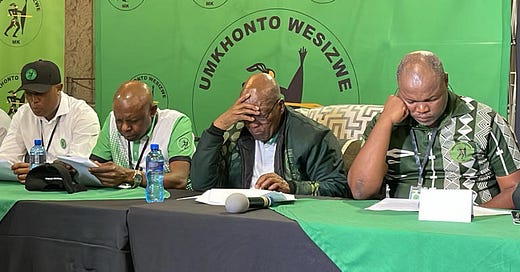Can any Self-Respecting Woman Support the MK Party Amid South Africa’s Gender-Based Violence Crisis?
A party that shelters alleged abusers cannot truly call itself progressive and women supporting it must reckon with that truth.
South Africa is in the throes of a femicide emergency. Each passing month brings another brutal reminder of how perilously unsafe this country remains for women. In March, we were shaken by the case of alleged rape of seven-year-old Cwecwe at her school, a place that should be a sanctuary. Just weeks later, in May, the country mourned the horrific killing of Olorato Mongale, a young woman who went on a date and ended up dead, her body dumped unceremoniously. These are not isolated incidents. They are part of a larger, unrelenting pattern of violence against women that continues unabated, as if normalised by the very institutions meant to protect us.
According to SAPS statistics, over 42,000 rape cases were reported in the 2023/24 period an average of more than 116 daily. The actual number is almost certainly higher, given the stigma and barriers women face in reporting. South Africa’s gender-based violence crisis is not just a statistic; it is a state of national emergency. And yet, this crisis exists alongside a disturbing pattern of impunity, especially for men in positions of power.
Amid this crisis, the uMkhonto weSizwe (MK) Party has emerged as a powerful new political force, securing 14% of the national vote in the 2024 general elections and now positioning itself as the official opposition in Parliament. Led by former president Jacob Zuma, the party’s popularity surged on the back of populist rhetoric, radical economic promises, and a rejection of the established political order. It claims to be a progressive party, one that advocates for land reform, economic justice, and the restoration of dignity to the marginalised. But what does it really mean to be progressive in a country where women are dying at the hands of men every single day?
That question demands more than a manifesto; it demands moral clarity.
Jacob Zuma’s political career is inextricably tied to one of South Africa’s most high-profile rape trials. In 2006, he was acquitted of raping Fezekile Ntsukela Kuzwayo, known as Khwezi. Despite the court’s verdict, the trial itself was a harrowing indictment of how women are treated in our justice system and by society at large. Khwezi was vilified, intimidated, and forced into exile. Her voice was drowned out by a toxic public culture that prioritised the political survival of a man over the dignity and safety of a woman.
Nearly two decades later, those dynamics remain unchanged. MK’s deputy president, John Hlophe, has been accused of sexual harassment by former party member Mary Phadi. He has denied the allegations and threatened legal action, but the response from the party has not demonstrated the kind of accountability or seriousness one would expect from a political formation that claims to be progressive. Instead, there is silence, obfuscation, and business as usual.
We must ask: can a party that harbours men with unresolved allegations of sexual misconduct truly call itself progressive? And more importantly, can the South African public, especially women, in good conscience continue to support such a party?
This is not to suggest that MK is the singular cause of South Africa’s gender crisis, far from it. GBV rates did not originate with the MK Party, nor with Zuma. But what is deeply troubling is the way the South African public continues to elevate men to positions of immense power, despite clear red flags about their conduct. We hold male politicians on pedestals, choosing to forget, forgive, or worse, dismiss the pain of women in the process.
MK's meteoric rise is a mirror held up to South African society. It forces us to confront the uncomfortable truth that too many of us are willing to compartmentalise or outright ignore gender-based violence when it becomes politically inconvenient. This is not just a critique of the MK Party, it is a critique of our collective moral compass. We cannot build a just, equitable, or truly progressive society while excusing or normalising the abuse of women.
The question, then, is urgent and personal: Can a self-respecting woman support the MK Party?
To answer that is to reckon with the values we hold as individuals and as a nation. It is not enough to quote Freedom Charter slogans or don the garments of the struggle. Progressivism is not merely about economic redistribution or nationalisation. It must also be about the dignity, safety, and agency of women. If a political party cannot guarantee that it will centre those principles if it continues to elevate leaders who are tainted by serious allegations, then it does not deserve to call itself progressive. And it certainly does not deserve the support of women who value their lives and freedoms.
The fight against gender-based violence is not a footnote in our national politics; it is the defining moral struggle of our time. And we cannot afford to get this wrong.



